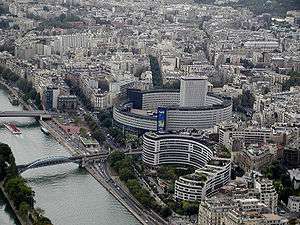Radio France
 | |
| State-owned plc | |
| Founded | 1 January 1975 |
| Headquarters | Paris, France |
Area served | France |
Key people | Mathieu Gallet (CEO) |
| Products | Radio broadcasting, Production, Orchestras |
| Services | Public radio |
| Owner | Government of France |
| Website |
radiofrance |
Radio France is a French public service radio broadcaster.
Stations
Radio France offers seven national networks:
- France Inter — Radio France's "generalist" station, featuring entertaining and informative talk mixed with a wide variety of music, plus hourly news bulletins with extended news coverage in the morning, midday, and early-evening peaks
- France Info — 24-hour news
- France Culture — cultural programming covering the arts, history, science, philosophy, etc. together with in-depth news coverage at peak times
- France Musique — classical music and jazz
- France Bleu — a network of 44 regional stations, mixing popular music with locally based talk and information, including:
- France Bleu 107.1 — for the Paris-Île-de-France region
- France Bleu Béarn — Pyrénées-Atlantiques
- France Bleu Nord — Nord and Pas de Calais
- FIP — specialising in a wide range of music – classical, hip hop, jazz, chanson, rock, blues, world music – and minimal speech
- Mouv' — pop music, aimed at a young audience
Mission
Radio France's two principal missions are:
- To create and expand the programming on all of their stations; and
- To assure the development and the management of the following four orchestras and choirs:
- l'Orchestre National de France (National Orchestra of France)
- l'Orchestre Philharmonique de Radio France (Radio France Philharmonic Orchestra)
- Le Chœur de Radio France (Choir of Radio France)
- La Maîtrise de Radio France (Choir School of Radio France with a choir of children and teenagers)
History timeline
- 1897: A year after Marconi’s experiments, Eugène Ducretet begins his trials of radio broadcasting from a mast on the third level of the Eiffel Tower
- 1921: The weather forecast and the stock market prices are read from a studio in the Eiffel Tower.
- 6 November 1922 (eight days before the BBC): Radiola, the first French private radio transmitter, begins regular broadcasts. It changes its name to Radio Paris in 1924. It is followed by Radio Toulouse and Radio Lyon, and in 1932/1933 by Radio Luxembourg. Before World War II, 14 commercial and 12 public sector radios operate in France.
- 1940–44: In both the German Occupied zone and under the Vichy regime in the south, radio is taken over by the State.
- 1942–43: With the agreement of Vichy, Radio Monte Carlo and its financial holding company la SOFIRAD are born.
- 1944: At the Liberation of France, the state broadcasting monopoly is retained for practical and ideological reasons. Public service radio broadcasting is ensured by the RDF, soon to be called the RTF, then the ORTF in 1964.
- 1955: The commercial station Europe No. 1 begins broadcasting from across the border in the Sarre region of Germany, freed from French occupation in that year.
- 1965: Under the management of Roland Dhordain, the four French radio stations are reorganised: France I and II are merged to "RTF Inter", later renamed "France Inter"; France III is renamed "RTF Promotion", and later "France Culture"; France IV is renamed "RTF Haute Fidelité", and later "France Musique".
- 1975: When the ORTF is broken up into separate TV channels (TF1 (Télévision française 1), antenne 2, France Région 3), technical services (TDF — Télédiffusion de France), archive services and professional training (INA — Institut National de l'Audiovisuel), production and audiovisual creation services (SFP — Société Française de Production) and radio, Radio France gains its independence from other media institutions as the state controlled public service radio broadcaster.
- 1981: Following pressure from the independent and commercial radio lobbies and pirate broadcasters, the newly elected President François Mitterrand allows the licensing of "free" radio stations, to become "radios locales privées", initially with a state subsidy and then financed by commercial advertising (1984), and finally to group themselves into national networks (1986). A private radio sector broadcasting from within French borders is reborn.
- 1999: The daily radio audience (reach) is 83%. They listen on average for over three hours a day. 99% of French homes have a radio. 80% of French households have a car radio, and 26.8% a personal stereo.
- 2000: Radio France re-organises its radio network. France Bleu becomes a regional-only network, primarily on FM (the national AM radio network was re-attributed to France Info) and several FIP stations in large cities were closed down and replaced with youth station Le Mouv'.
- 2015: Radio France announced the end of its Medium Wave (AM) broadcasts at the end of December 31.[1]
Headquarters

The Maison de la Radio seen from the Eiffel Tower
Radio France has its headquarters at the Maison de la Radio, a circular building designed by the architect Henry Bernard (architect) and inaugurated in December 1963 by President Charles de Gaulle, which stands beside the River Seine in the 16th arrondissement of Paris. In addition to housing Radio France's central services and the studios of several of its channels, the building is home to the Musée de Radio France, a museum of radio and television broadcasting and recording techniques. The building caught fire in October 2014.[2]
See also
References
- Information from Geoff Hare, Newcastle University
- ↑
- ↑ "Radio France's Maison de la Radio ablaze in Paris". Deutsche Welle. Retrieved 31 October 2014.
External links
- Radio France (French)
- Radio France Streaming Online (French)
This article is issued from Wikipedia - version of the 12/1/2016. The text is available under the Creative Commons Attribution/Share Alike but additional terms may apply for the media files.